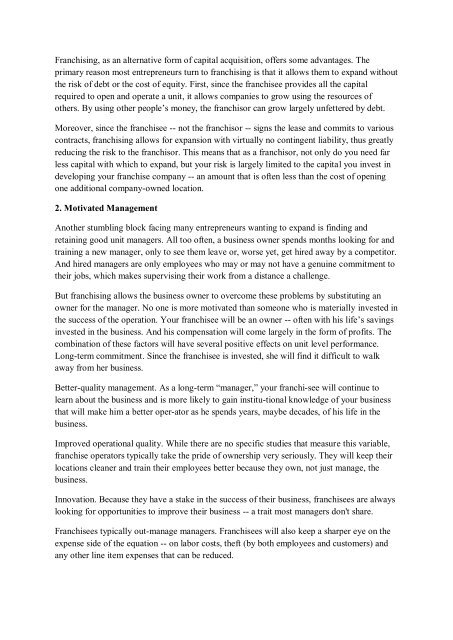Franchising and its Benefits1
Create successful ePaper yourself
Turn your PDF publications into a flip-book with our unique Google optimized e-Paper software.
<strong>Franchising</strong>, as an alternative form of capital acquisition, offers some advantages. The<br />
primary reason most entrepreneurs turn to franchising is that it allows them to exp<strong>and</strong> without<br />
the risk of debt or the cost of equity. First, since the franchisee provides all the capital<br />
required to open <strong>and</strong> operate a unit, it allows companies to grow using the resources of<br />
others. By using other people’s money, the franchisor can grow largely unfettered by debt.<br />
Moreover, since the franchisee -- not the franchisor -- signs the lease <strong>and</strong> comm<strong>its</strong> to various<br />
contracts, franchising allows for expansion with virtually no contingent liability, thus greatly<br />
reducing the risk to the franchisor. This means that as a franchisor, not only do you need far<br />
less capital with which to exp<strong>and</strong>, but your risk is largely limited to the capital you invest in<br />
developing your franchise company -- an amount that is often less than the cost of opening<br />
one additional company-owned location.<br />
2. Motivated Management<br />
Another stumbling block facing many entrepreneurs wanting to exp<strong>and</strong> is finding <strong>and</strong><br />
retaining good unit managers. All too often, a business owner spends months looking for <strong>and</strong><br />
training a new manager, only to see them leave or, worse yet, get hired away by a competitor.<br />
And hired managers are only employees who may or may not have a genuine commitment to<br />
their jobs, which makes supervising their work from a distance a challenge.<br />
But franchising allows the business owner to overcome these problems by substituting an<br />
owner for the manager. No one is more motivated than someone who is materially invested in<br />
the success of the operation. Your franchisee will be an owner -- often with his life’s savings<br />
invested in the business. And his compensation will come largely in the form of prof<strong>its</strong>. The<br />
combination of these factors will have several positive effects on unit level performance.<br />
Long-term commitment. Since the franchisee is invested, she will find it difficult to walk<br />
away from her business.<br />
Better-quality management. As a long-term “manager,” your franchisee will continue to<br />
learn about the business <strong>and</strong> is more likely to gain institutional knowledge of your business<br />
that will make him a better operator as he spends years, maybe decades, of his life in the<br />
business.<br />
Improved operational quality. While there are no specific studies that measure this variable,<br />
franchise operators typically take the pride of ownership very seriously. They will keep their<br />
locations cleaner <strong>and</strong> train their employees better because they own, not just manage, the<br />
business.<br />
Innovation. Because they have a stake in the success of their business, franchisees are always<br />
looking for opportunities to improve their business -- a trait most managers don't share.<br />
Franchisees typically out-manage managers. Franchisees will also keep a sharper eye on the<br />
expense side of the equation -- on labor costs, theft (by both employees <strong>and</strong> customers) <strong>and</strong><br />
any other line item expenses that can be reduced.


